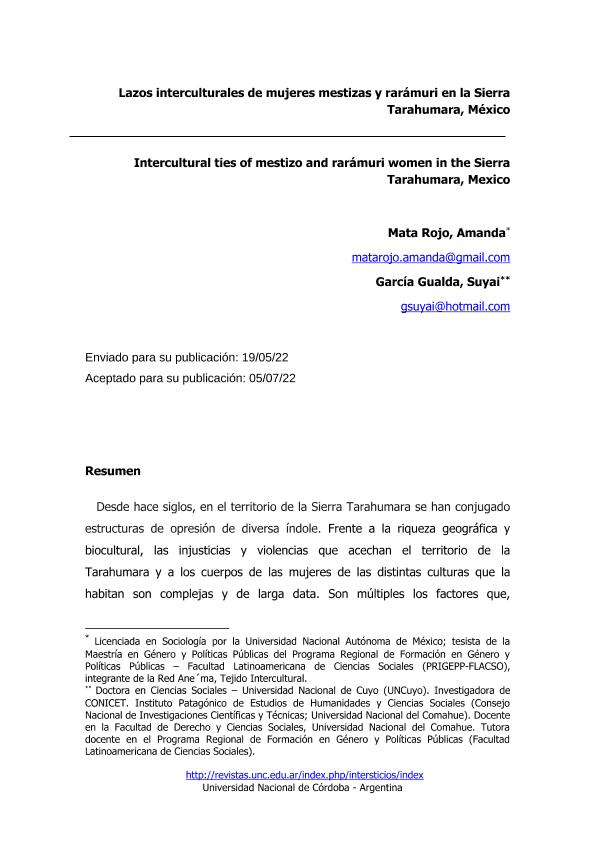Artículo
Desde hace siglos, en el territorio de la Sierra Tarahumara se han conjugado estructuras de opresión de diversa índole. Frente a la riqueza geográfica y biocultural, las injusticias y violencias que acechan el territorio de la Tarahumara y a los cuerpos de las mujeres de las distintas culturas que la habitan son complejas y de larga data. Son múltiples los factores que, históricamente, se han entrecruzado dando como resultado un preocupante atropello de los derechos colectivos de los pueblos originarios y de las mujeres que habitan el territorio. En la actual etapa de acumulación capitalista las comunidades indígenas están atravesadas por la inseguridad y la violencia del narcotráfico, así como por el acecho de grandes empresas turísticas, mineras y extractivistas. Pese a ello, las mujeres rarámuri y mestizas consiguen organizarse, tejer y entretejer modos otros de resistencia frente al destino sombrío que parece imponerse inexorablemente. En este contexto emerge la Red Ane´ma, Tejido Intercultural, como espacio propicio para sentir, pensar, decir y hacer los territorios-tierra y cuerpos-territorios. En el presente artículo nos interesa problematizar, a partir de lecturas teóricas en diálogo con notas de campo, el contexto de surgimiento de la Red e indagar en las formas de organización y participación que estas mujeres han comenzado a tramar de forma colectiva e intercultural. For centuries, structures of oppression of various kinds have been combined in the territory of the Sierra Tarahumara. Faced with the geographical and biocultural wealth, injustices and violence haunt the Tarahumara territory and the bodies of the women of the different cultures that have inhabit it for longstanding. There are multiple factors that, historically, have intertwined, resulting in a worrying violation of the collective rights of the original peoples and of the women who inhabit the territory. In the current stage of capitalist accumulation, indigenous communities are plagued by insecurity and drugtrafficking violence, as well as by the stalking of tourism, mining, and extractivist large companies. To these conditions of vulnerability, situations of gender violence within the communities are added. Despite this, Rarámuri and mestizo women manage to organize themselves, weave and interweave other ways of resistance against the gloomy fate that seems to impose itself inexorably. In this context, the Ane'ma Network, Intercultural Fabric, emerges as a propitious space to feel, think, say and make the territories-land and bodies-territories. In this article, we are interested in problematize the context of the emergence of the Network in Creel location, based on theoretical readings in dialogue with field notes, and investigate the forms of organization and participation that these women have begun to weave collectively and interculturally.
Lazos interculturales de mujeres mestizas y rarámuri en la Sierra Tarahumara, México
Título:
Intercultural ties of mestizo and rarámuri women in the Sierra Tarahumara, Mexico
Fecha de publicación:
07/2022
Editorial:
Universidad Nacional de Córdoba. Facultad de Filosofía y Humanidades. Centro de Investigaciones. Grupo de Filosofía Latinoamericana
Revista:
Intersticios de la política y la cultura: Intervenciones latinoamericanas
e-ISSN:
2250-6543
Idioma:
Español
Tipo de recurso:
Artículo publicado
Clasificación temática:
Resumen
Archivos asociados
Licencia
Identificadores
Colecciones
Articulos(IPEHCS)
Articulos de INSTITUTO PATAGONICO DE ESTUDIOS DE HUMANIDADES Y CIENCIAS SOCIALES
Articulos de INSTITUTO PATAGONICO DE ESTUDIOS DE HUMANIDADES Y CIENCIAS SOCIALES
Citación
Mata Rojo, Amanda; Garcia Gualda, Suyai Malen; Lazos interculturales de mujeres mestizas y rarámuri en la Sierra Tarahumara, México; Universidad Nacional de Córdoba. Facultad de Filosofía y Humanidades. Centro de Investigaciones. Grupo de Filosofía Latinoamericana; Intersticios de la política y la cultura: Intervenciones latinoamericanas; 11; 21; 7-2022; 63-82
Compartir




